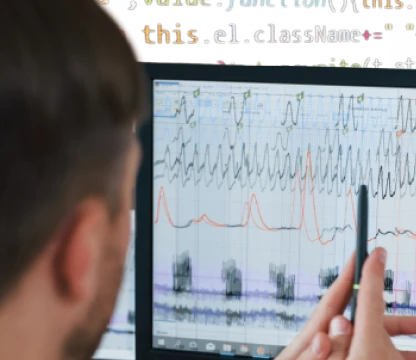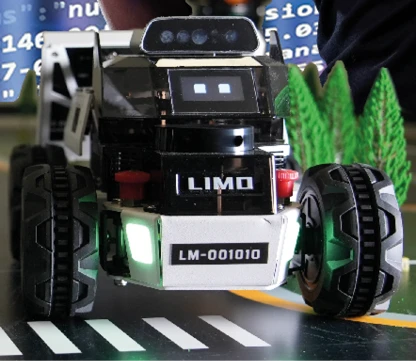Meeting Tomorrow’s
Technological
Challenges
This training prepares you for careers in digital technology across high-potential industrial sectors.
The Digital Systems degree at ENSEM offers cutting-edge education in a rapidly growing field, blending practical experience, global exposure, hands-on learning, small group settings, and personalized support. The scientific curriculum is complemented by a broad education in languages, communication, management sciences, and systems engineering. Real-world experience is ensured through internships and frequent industry-led sessions. It is an outstanding opportunity for those aiming to actively shape the future of digital and industrial transition.
Rencontre avec Flora Vernerey (ENSEM Promo 2022), doctorante rattachée au département CID
Flora Vernerey est en première année de thèse au CRAN sous la direction de Pierre Riedinger et Jamal Daafouz. Elle est rattachée au département CID. Dans cette vidéo, elle nous explique son sujet de thèse et raconte sa vie de doctorante.
Rencontre avec Flora Vernerey (ENSEM Promo 2022), doctorante rattachée au département CID
Flora Vernerey est en première année de thèse au CRAN sous la direction de Pierre Riedinger et Jamal Daafouz. Elle est rattachée au département CID. Dans cette vidéo, elle nous explique son sujet de thèse et raconte sa vie de doctorante.
Digital Systems
Degree
Available as a full-time student program
or via work-study
Signal Processing, Computer Science, Applied Mathematics, Automation
TRAINING OBJECTIVES
ENSEM’s Digital Systems degree trains experts to design, develop, and manage innovative digital systems, supporting companies’ digital transformation with efficiency, resilience, and ethical awareness.
The program offers comprehensive training in automation, computer science, signal processing, safety, security, and artificial intelligence. It equips students with the skills to create intelligent, autonomous physical systems with communication and decision-making capabilities — the kind used in Industry 4.0 and smart transportation. It also covers digital tools for engineering support, such as numerical simulation, virtualization, diagnostics, and AI-driven decision-making.
Students gain exposure to emerging technologies through projects and research groups, preparing them to tackle innovation challenges. The curriculum includes an international component with seventeen weeks abroad and management training. Internships and regular industry engagements ensure professional opportunities and industrial immersion.
Driving and Supporting the Digital Transition
Always at the forefront of digital innovation, ENSEM offers a comprehensive program covering everything from software development to control systems design and signal/data processing.

DIGITAL TOOLS
IN ENGINEERING
• Numerical modeling and simulation
• Virtualization and digital twins
• Information systems
• Digital prototyping
• Scientific computing

EMBEDDED,
AUTONOMOUS SYSTEMS
• Control and management of dynamic systems
• AI and data analysis
• Reliability and cybersecurity
• Embedded and distributed computing
• Internet of Things (IoT) & sensor networks

DIGITAL TOOLS FOR
COMPLEX SYSTEMS
MANAGEMENT
• Biomedical signals and image processing
• Data analysis and pattern recognition
• Artificial intelligence
• Signal, data, and information processing
• Digital decision-support and optimization tools
Careers and Professional Opportunities
Digital Systems engineers are highly sought after in sectors such as telecommunications, automotive, healthcare, aerospace, and more. Their expertise is vital for meeting today’s and tomorrow’s technological challenges, from IoT development and autonomous vehicles to smart infrastructure.
A Highly Valued Degree
• 93% of ENSEM graduates secure a job within six weeks after graduation, 64% of them directly following their internship.
• Average starting salary: €37,000 gross per year.
Typical Job Titles:
Digital Systems Engineer, Computer Engineer, Network and Telecommunications Engineer, Digital Electronics Engineer, Embedded Systems Engineer, Cybersecurity Engineer, Automation and Industrial IT Engineer, AI Engineer, Software Engineer.
Digital Systems
Training Program
For full-time students
together
let’s invent
our future
The program is organized by semesters and takes place over five semesters on campus (S5 to S9), followed by a six-month internship in a company (S10).
1st Year (S5 & S6)
• Core curriculum in fundamental engineering sciences (Mathematics, Electrical Systems and Circuits).
• Core curriculum in digital sciences (Automation, Computer Science, Signal Processing).
• Core curriculum in economics, humanities, and social sciences (communication, foreign languages, workplace health & safety, entrepreneurship, career project preparation…).
• 1st-year internship: introduction to the professional environment.
• Languages: English + another foreign language : Spanish, German, Italian, Chinese, French for foreign learners etc.
• Project work.
• Exploration of engineering careers through meetings and talks led by industry professionals.
• Insight into the business world via company visits.
• Exposure to research through collaboration with the school’s six partner laboratories.
2nd Year (S7 & S8)
• Core curriculum in digital sciences (System control and management, Computer Science, Networks & Telecommunications, AI, Safety & Security, Robotics).
• Core curriculum in economics, humanities, and social sciences (communication, foreign languages, workplace health & safety, entrepreneurship, career project preparation…).
• Specialization tracks starting in S8:
Embedded Systems & Software (joint with Telecom Nancy)
Intelligent & Autonomous Systems
• Optional 2-month internship.
• Languages: English + another foreign language: Spanish, German, Italian, Chinese, French for foreign learners etc.
• Project work.
• Exploration of engineering careers through meetings and talks led by industry professionals.
• Insight into the business world via company visits.
• Exposure to research through collaboration with the school’s six partner laboratories.
3rd Year (S9 & S10)
• Core curriculum in economics, humanities, and social sciences (communication, foreign languages, workplace health & safety, entrepreneurship, career project preparation…).
• Specialization tracks (S9):
Embedded Systems & Software (joint with Telecom Nancy)
Intelligent & Autonomous Systems
• Six-month internship in a company (S10)
Frequently Asked Questions
What is the cost of the program?
Tuition fees for the 2025/2026 academic year are as follows:
• Students from the European Union:
– Non-scholarship students: €628
– Scholarship students: €0
– Full waiver for students enrolled through an exchange or dual-degree agreement with an ENSEM partner university.
The Student and Campus Life Contribution (CVEC) is €105.
• Non-EU Students:
– Full waiver for students enrolled through an exchange or dual-degree agreement with an ENSEM partner university.
– €628 for students coming from CPGE competitive exams.
– €3,941 for other non-EU students who don’t fall under the cases mentioned above.
The Student and Campus Life Contribution (CVEC) is €105.
How many weeks of international mobility do I need to complete?
17 weeks during the initial training program.
Digital Systems Engineering Program
Work-Study Track
Apprenticeship
together,
let’s invent
our future
What is the Apprentice Engineer Track ?
The work-study track allows students to combine academic studies with hands-on professional experience in a company. Apprenticeship contracts typically last 3 years and are formal employment agreements signed by both the student and the company, where the student has full employee status throughout the program.
Employers highly value graduates from this track, as they enter the job market with both advanced technical skills and extensive, practical experience directly applicable to their field.
Apprentice engineers earn a salary that may reach up to 80% of France’s legal minimum wage (SMIC). Like any employee, they are entitled to vacation time and must meet company attendance and workplace obligations, both during their time in the company and while attending school.
Each engineering school manages its own admission process for apprenticeship programs, typically involving a review of the candidate’s academic file and an interview.
A DEGREE IDENTICAL TO THE FULL-TIME TRACK.
The ENSEM apprenticeship program (FISA track) leads to the same degree as the full-time (FISE) program. However, the structure of the program differs due to the alternating schedule: approximately one month in school followed by one month in the company (62 weeks at school and 79 weeks in the company over 3 years).
The curriculum is more generalist during the first two years compared to the FISE program (which offers 3 semesters of core curriculum). Despite the different structure, the academic content remains equivalent. The FISA program uses a different system of course units to allow flexibility and balance for students with diverse academic backgrounds prior to joining the school.
Starting from Semester 9, FISA students select specialization modules that are shared with the FISE program. However, due to the alternating rhythm, the range of choices is slightly more limited, and the proportion of core courses remains higher. Companies hosting apprentices are consulted to help determine the specialization modules chosen by the students.
The in-company training focuses on real-world professional situations, as well as the development of key engineering skills such as methodology, communication, project management, and leadership.
1st Year (S5 & S6)
• Core curriculum in fundamental engineering sciences (Mathematics, Electrical Systems and Circuits)
• Core curriculum in digital sciences (Automation, Computer Science, Signal Processing)
• Core curriculum in economics, humanities, and social sciences (Communication, Foreign Languages, Occupational Health and Safety, Entrepreneurship, Career Planning, etc.).
• Choice of foreign languages: English (mandatory), plus a second language (Spanish or German).
• Project-based learning.
• Exposure to engineering professions through meetings and lectures led by industry professionals.
• Insight into the business world through company visits.
• Introduction to research via the school’s 6 partner laboratories.
2nd Year (S7 & S8)
• Core curriculum in fundamental engineering sciences
• Core curriculum in applied sciences (Mathematics, Automation, Thermodynamics and Simulation, Engineering Office, Computer Science).
• Core curriculum in economics, humanities, and social sciences.
• Choice of foreign languages: English (mandatory), plus a second language (Spanish or German).
• Projects and professional exposure.
• Business world immersion and research discovery.
3rd Year (S9 & S10)
• Economics, humanities, and social sciences.
• Specialization through skill blocks (Semester 9):
> Intelligent and secure communication systems, advanced machine architectures, and cutting-edge embedded technologies.
> Signal and image processing, control and command, safety and security, distributed systems, robotics and autonomous vehicles.
-
Syllabus
S9 & S10
Frequently Asked Questions
What is the cost of the program?
Apprenticeship training is funded by the OPCO (Skills Operator) affiliated with the company employing the apprentice.
There are no registration fees for apprentices or work-study students under a professional training contract.
How many weeks of international mobility do I need to complete?
9 weeks during the apprenticeship program.


